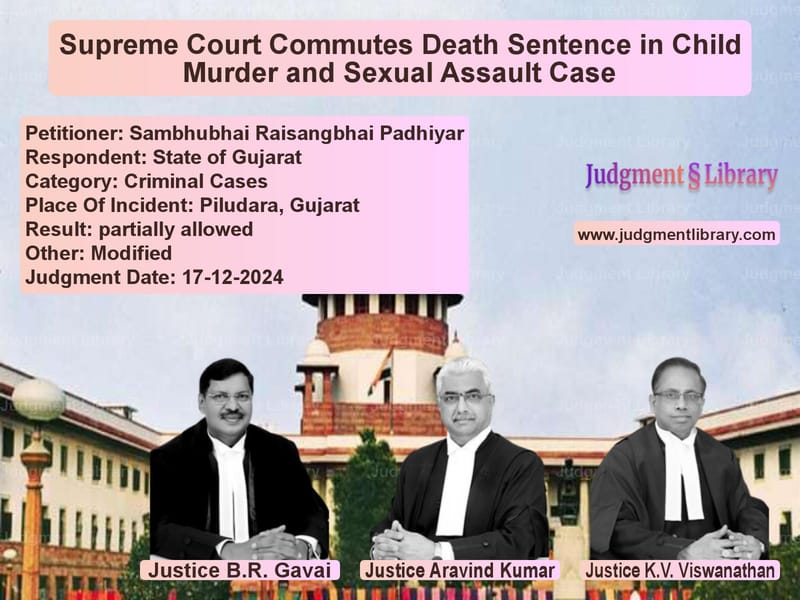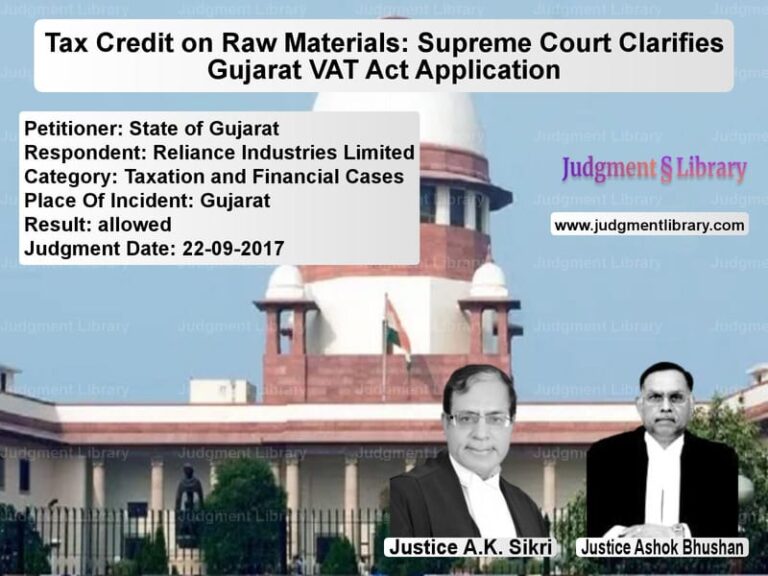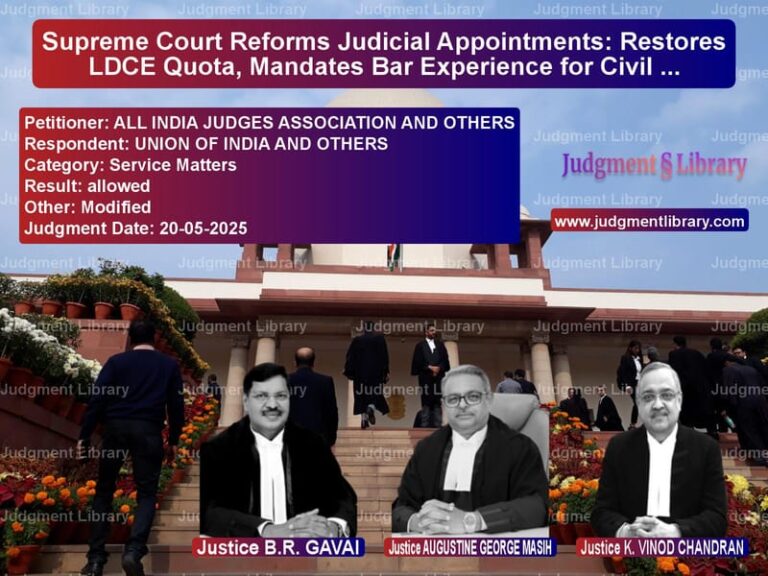Supreme Court Commutes Death Sentence in Child Murder and Sexual Assault Case
The Supreme Court of India has commuted the death sentence of Sambhubhai Raisangbhai Padhiyar, convicted for the kidnapping, sexual assault, and murder of a four-year-old child in Gujarat. While maintaining his conviction under Sections 302 (murder), 364 (kidnapping), and 377 (unnatural offences) of the Indian Penal Code (IPC) along with Sections 4 and 6 of the Protection of Children from Sexual Offences (POCSO) Act, the Court substituted the death penalty with rigorous imprisonment for 25 years without remission.
Background of the Case
The case pertains to the brutal sexual assault and murder of a four-year-old boy, Rohit @ Shital, on April 13, 2016, in Piludara village, Gujarat. The key events were:
- Rohit’s parents left for work in the morning, leaving him with his grandmother.
- He was last seen playing near the temple when the accused took him away, claiming he would buy him ice cream.
- His body was found naked near a lake in the evening.
- The post-mortem report confirmed death due to asphyxia by throttling and evidence of sexual assault.
- The accused was arrested the next day, and his medical examination revealed injuries on his genitals.
Trial and High Court Judgment
The Sessions Court convicted the accused and imposed the death penalty, which was upheld by the Gujarat High Court in 2019. The High Court deemed the crime as one of the “rarest of rare” cases warranting capital punishment.
Supreme Court’s Analysis and Ruling
A bench comprising Justices B.R. Gavai, Aravind Kumar, and K.V. Viswanathan examined the case and modified the sentence while affirming the conviction.
1. Conviction Based on Circumstantial Evidence
The Supreme Court held that the conviction was justified based on strong circumstantial evidence:
- The child was last seen with the accused, as testified by multiple witnesses.
- Injuries on the accused’s genitals matched the nature of the assault.
- The accused led the police to the victim’s clothes.
- The forensic report confirmed that semen found on the victim matched the accused.
2. Death Sentence Not Justified
While acknowledging the brutality of the crime, the Court ruled that the death penalty was not warranted due to mitigating factors:
- The accused was 24 years old at the time of the crime.
- He had no prior criminal record.
- His medical history indicated intellectual disability and psychotic features.
- A psychological evaluation showed a possibility of reformation.
“Considering the socio-economic background of the accused and his medical condition, the option of life imprisonment is not foreclosed.”
3. 25-Year Imprisonment Without Remission
The Court cited Swamy Shraddananda v. State of Karnataka, stating that in cases where death penalty is excessive but life imprisonment is inadequate, an intermediate sentence can be imposed.
“A sentence of life imprisonment which normally works out to 14 years would be grossly disproportionate. A 25-year imprisonment without remission is a just desert.”
Final Judgment
The Supreme Court ruled:
- The conviction under IPC Sections 302, 364, 377, and POCSO Act Sections 4 and 6 was upheld.
- The death sentence was commuted to 25 years of rigorous imprisonment without remission.
- Sentences under IPC Section 364 (10 years) and POCSO Act Section 6 (life imprisonment) will run concurrently.
- The fine imposed by the lower courts was waived.
Implications of the Judgment
This ruling has several important implications:
1. Balanced Approach to Sentencing
The judgment reinforces that death penalty should be imposed only in cases where reformation is impossible.
2. Strengthening Child Protection Laws
The Court affirmed stringent punishment for crimes against children while balancing judicial discretion.
3. Consideration of Mental Health in Sentencing
The ruling highlights the role of psychiatric evaluations in determining appropriate punishment.
Conclusion
The Supreme Court’s ruling in Sambhubhai Raisangbhai Padhiyar v. State of Gujarat sets a precedent in child sexual assault and murder cases. By commuting the death penalty to a fixed-term imprisonment, the Court reinforced a balance between retributive justice and the possibility of reformation, ensuring that the punishment remains severe yet proportionate to the crime.
Read also: https://judgmentlibrary.com/bail-under-uapa-supreme-courts-judgment-on-athar-parwezs-case/
Petitioner Name: Sambhubhai Raisangbhai Padhiyar.Respondent Name: State of Gujarat.Judgment By: Justice B.R. Gavai, Justice Aravind Kumar, Justice K.V. Viswanathan.Place Of Incident: Piludara, Gujarat.Judgment Date: 17-12-2024.
Don’t miss out on the full details! Download the complete judgment in PDF format below and gain valuable insights instantly!
Download Judgment: sambhubhai-raisangbh-vs-state-of-gujarat-supreme-court-of-india-judgment-dated-17-12-2024.pdf
Directly Download Judgment: Directly download this Judgment
See all petitions in Murder Cases
See all petitions in Rape Cases
See all petitions in Juvenile Justice
See all petitions in Judgment by B R Gavai
See all petitions in Judgment by Aravind Kumar
See all petitions in Judgment by K.V. Viswanathan
See all petitions in partially allowed
See all petitions in Modified
See all petitions in supreme court of India judgments December 2024
See all petitions in 2024 judgments
See all posts in Criminal Cases Category
See all allowed petitions in Criminal Cases Category
See all Dismissed petitions in Criminal Cases Category
See all partially allowed petitions in Criminal Cases Category







